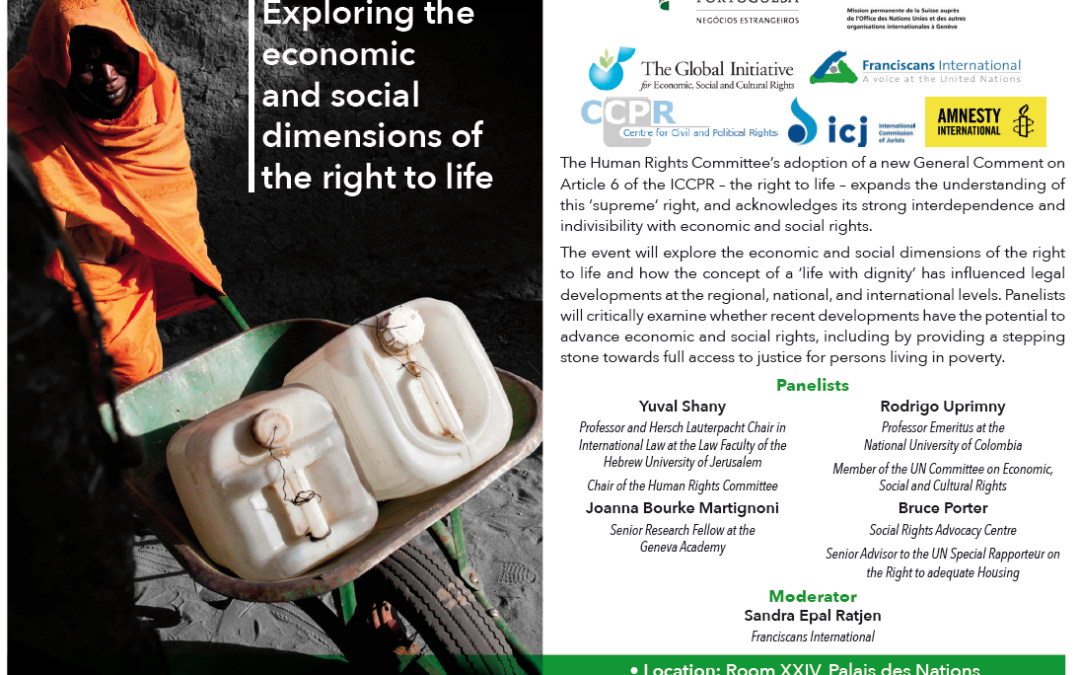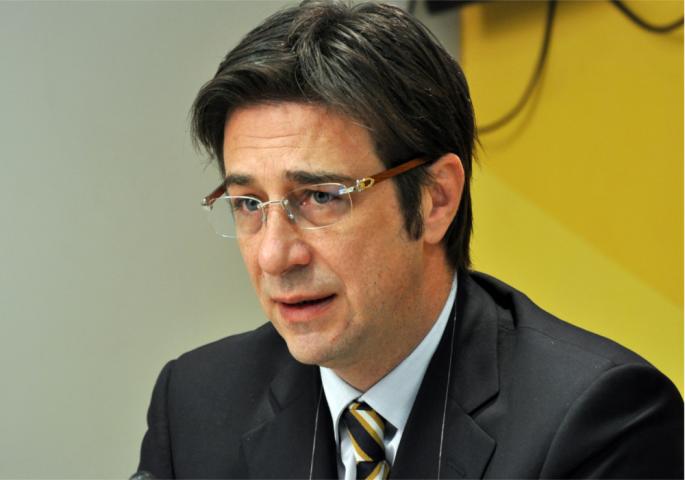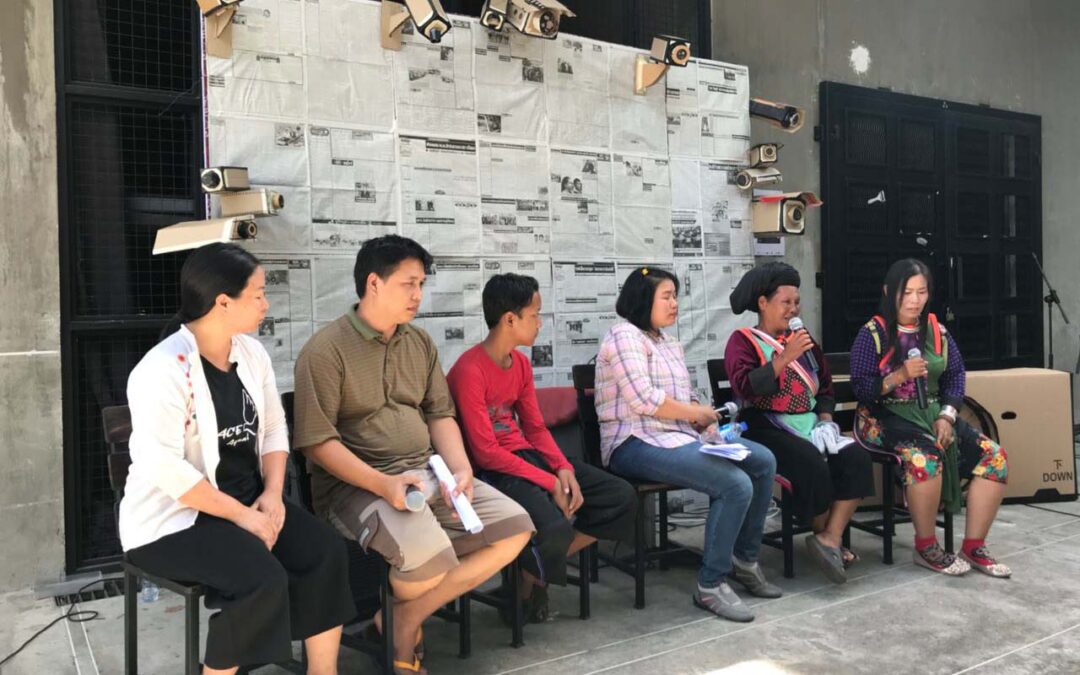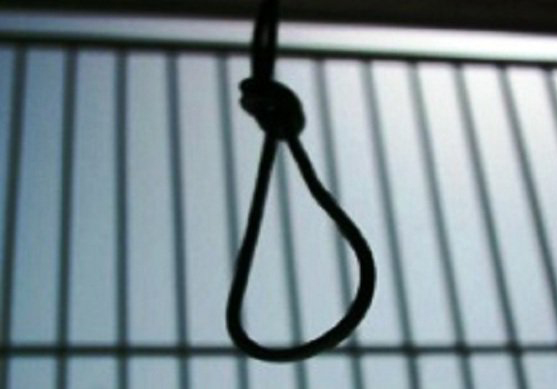
Mar 4, 2019 | Events, News
This side event will take place on 6 March, from 13.30-15.00, in Room XXIV of the Palais des Nations in Geneva.
The Human Rights Committee’s adoption of a new General Comment on Article 6 of the ICCPR – the right to life – expands the understanding of this ‘supreme’ right, and acknowledges its strong interdependence and indivisibility with economic and social rights.
The event will explore the economic and social dimensions of the right to life and how the concept of a ‘life with dignity’ has influenced legal developments at the regional, national, and international levels. Panelists will critically examine whether recent developments have the potential to advance economic and social rights, including by providing a stepping stone towards full access to justice for persons living in poverty.
Speakers:
Yuval Shany, Professor and Hersch Lauterpacht Chair in International Law at the Law Faculty of the Hebrew University of Jerusalem, Chair of the Human Rights Committee and Rapporteur for General Comment 36.
Rodrigo Uprimny, Professor Emeritus at the Professor Emeritus at the National University of Colombia, Member of the Committee on Economic, Social and Cultural Rights, ICJ Commissioner.
Bruce Porter, Executive Director, Social Rights Advocacy Centre, Chief Advisor to the UN Special Rapporteur on the right to adequate housing.
Joanna Bourke-Martignoni, Senior Research Fellow, Geneva Academy of International Humanitarian Law and Human Rights.
Moderator:
Sandra Epal Ratjen, International Advocacy Director and Deputy Executive Director, Franciscans International.
Universal-R2Life and ES rights-News-events-2019-ENG (Concept note in PDF)

Jul 30, 2018 | News
The killing of Serbian defense lawyer Dragoslav Ognjanović must be independently, promptly, and thoroughly investigated and the perpetrators brought to justice, the ICJ said today.
Dragoslav Ognjanović (photo), a prominent lawyer who had defended Slobodan Milosovic and had also represented defendants in cases of organized crime, was shot dead outside his home in Belgrade late on Saturday 28 July.
“Safety of lawyers is essential to the fair operation of the justice system and to protection of the rule of law. The Serbian authorities now need to take urgent steps to re-establish confidence that they can ensure the safety of lawyers who may be under threat, and to investigate and bring to justice the perpetrators of this crime,” said Justice Radmila Dragicevic-Dicic, of Serbia’s Supreme Court, Vice-President of the ICJ.
“Investigation and prosecution of this case will be a significant test for the Serbian authorities and the legal system,” she added.
The Serbian and Belgrade bar associations have called a week-long suspension of work by lawyers in order to express their concern at the risk of violence against lawyers.
Serbian authorities have blamed an ongoing turf war between organized crime groups competing to control the narcotics trade.
“The concerns of the Serbian legal profession should be taken seriously by the government and the prosecution service, and the bar associations should be consulted on means to ensure the safety of lawyers,” said Róisín Pillay, Director of ICJ’s Europe Programme.
Additional information
International human rights law, including the European Convention on Human Rights to which Serbia is a party, requires that states take steps to protect the life and physical integrity of persons who they know or ought to know are at real risk of violence.
In addition, the right to life, protected under Article 2 of the European Convention as well as under other international law standards, requires states to ensure an independent, prompt and effective investigation into killings, with a view to bringing to justice those responsible.
According to the UN Basic Principles on the Role of Lawyers, governments must ensure that lawyers are able to perform all of their professional functions without intimidation, hindrance, harassment or improper interference (principle 16). The UN Basic Principles specify that “[w]here the security of lawyers is threatened as a result of discharging their functions, they shall be adequately safeguarded by the authorities” (principle 17).

Jul 13, 2018 | News
The Sri Lankan Government should reconsider and reverse its decision to bring back the death penalty for drug related offences, the ICJ said today.
On 10 July, the Sri Lankan Cabinet unanimously approved an action plan to implement the death penalty for “drug smugglers”.
According to the spokesperson of the Cabinet, 19 people convicted for “large scale drug offences” who “are still involved in drug trafficking…from within prisons” would initially be those initially designated for execution.
Sri Lanka has had a moratorium on the death penalty for over four decades.
The last execution carried out in the country was in 1976.
“The resumption of executions of convicted drug offenders would constitute a violation of the right to life under international law,” said Ian Seiderman, ICJ’s Legal and Policy Director.
”And, based on experience around the globe, it will not in any way serve the purported objective of tackling the problems of drug-related crime in Sri Lanka,” he added.
Article 6 of the International Covenant on Civil and Political Rights (ICCPR), which Sri Lanka acceded to in 1980, guarantees the right to life and requires that states that have not yet abolished the death penalty must restrict capital punishment to only the “most serious crimes”.
The UN Human Rights Committee, the supervisory body for the ICCPR, considers that the death penalty may never be used for drug offences.
The extraordinarily retrograde measure of resuming executions following a 42-year moratorium would also constitute a violation of article 6, which contemplates at least progressive movement towards abolition.
The UN General Assembly has repeatedly adopted resolutions emphasizing that that the use of the death penalty undermines human dignity and calling on those countries that maintain the death penalty to establish a moratorium on its use with a view to its abolition.
In 2016, an overwhelming majority of 117 UN Member States – including Sri Lanka – voted in favor of a worldwide moratorium on executions as a step towards abolition of the death penalty.
“At least 150 countries have now either abolished the death penalty in law or practice,” added Seiderman.
The ICJ considers the death penalty to be a violation to the right to life and the right not to be subjected to cruel, inhuman or degrading punishment.
The ICJ urges Sri Lanka to reinstate its moratorium on executions and take steps towards taking all necessary measures to abolish the death penalty.
Contact:
Ian Seiderman, ICJ’s Legal and Policy Director, email: ian.seiderman(a)icj.org
Reema Omer, ICJ’s International Legal Advisor, South Asia, email: reema.omer(a)icj.org

Jun 6, 2018 | News
On 5 June 2018, the ICJ co-organized an academic seminar addressing the right to life under international law and the State’s duty to effectively investigate alleged violations.
The event happened on the eve of the post mortem decision to be delivered by Chiang Mai Provincial Court in the case of Chaiyaphum Pasae.
The Lahu youth activist was killed by a military official who was attempting to arrest him as an alleged drug suspect in Chiang Dao district of Thailand’s northern Chiang Mai province in March 2017.
Officials claimed Chaiyaphum had resisted arrest and was subsequently shot in “an act of self-defence”.
On 6 June 2018, Chiang Mai Provincial Court ruled that the bullets shot by the military official had caused the death of Chaiyaphum Pasae.
In its decision, the court made no finding of fault and no finding as to whether Chaiyaphum Pasae had resisted arrest before his death.
The decision by Chiang Mai Provincial Court will now be sent on to the Public Prosecutor and inquiry officers, who will in parallel continue criminal investigations into the case.
The Public Prosecutor is expected thereafter to make a decision regarding any indictment of the military official who shot at Chaiyaphum Pasae.
Participants in the seminar, which was held at Chiang Mai University’s Art Center, included Chaiyaphum Pasae’s family members, interested members of the public, media representatives, students and academics.
Kingsley Abbott, ICJ Senior Legal Adviser, addressed the seminar on the right to life and the international law and standards that apply to investigating potentially unlawful deaths, including the rights of victims and family members, referring to the standards set out in the revised Minnesota Protocol on the Investigation of Potentially Unlawful Death (2016), which was launched in Thailand on 25 May 2017.
The event follows the ICJ’s first regional workshop on the investigation of potentially unlawful deaths and enforced disappearance in Asia, held last week in Bangkok for authorities from Thailand, Cambodia, Myanmar and Nepal.
Other speakers at the Workshop included Ratsada Manuratsada and Sumitchai Hattasarn, lawyers from Human Rights Lawyers Association (HRLA) who represented the family of Chaiyaphum Pasae, and Songkran Pongbunchan, a lecturer from Chiang Mai University’s Faculty of Law.
The Discussion was conducted in collaboration with Legal Research and Development Center Chiang Mai University (LRDC); Center for Protection and Revival of Local Community Rights (CPCR); Center for Ethnic Studies and Development Chiang Mai University (CESD); Human Rights Lawyers Association (HRLA); Protection International (PI); Holding Hands Group; Inter Mountain Peoples’ Education and Culture in Thailand Association (IMPECT); Cross Cultural Foundation (CrCF); Maayimstudio; Save Lahu Group; Lanyim Creative Group; Dinsorsee Creative Group; Northern Activist Community (CAN); and Tonkal Network.
This seminar is part of an ongoing engagement between the ICJ and Chiang Mai University’s Faculty of Law.
Contact
Kingsley Abbott, Senior Legal Adviser, ICJ Asia Pacific Regional Office, t: +66 94 470 1345, e: kingsley.abbott(a)icj.org

Jan 19, 2018 | News
The ICJ today condemned the executions of 22 civilians during the past month, following death penalty cases before military courts in which fair trial guarantees appear to have been flagrantly violated.
The Egyptian authorities should establish an immediate moratorium and halt all pending executions with a view towards the total and permanent abolition of the death penalty, the ICJ added.
“The executions of these civilians constitute blatant, egregious violations of the right to life by the Egyptian authorities,” said Said Benarbia, ICJ MENA Director.
“Carrying them out based on military trials, which furthermore failed to scrupulously observe international fair trial standards, amounts to the arbitrary deprivation of life,” he added.
Based on information provided by the defendants’ lawyers and families, Egyptian NGOs have reported a litany of fair trial violations that marred these proceedings.
These included the case of a defendant who was convicted following one trial session, in the absence of his counsel.
It also included instances involving enforced disappearances and allegations of torture and other ill-treatment, some of which were documented in the prosecution reports.
In one case the defendants’ lawyers filed a motion to “review the case” under article 448 of the Code Criminal Procedure which should normally suspend the carrying out of any sentence of execution.
The executions were nevertheless carried out on 9 January, before the Military Court’s review, which was due on 28 February 2018.
“The Egyptian authorities have brushed aside the most basic legal safeguards on the imposition and carrying out of the death penalty,” Benarbia said.
“Because they cannot ensure respect of fair trial rights, they must impose an immediate moratorium on executions.”
Under international standards, proceedings in death penalty cases must conform to the highest standards of judicial independence, competence and impartiality, and must strictly comply with all fair trial rights.
The ICJ has previously documented how the Egyptian judiciary fails to conform to these standards.
Contact
Saïd Benarbia, Director of the ICJ Middle East and North Africa Programme, t: +41.22.979.3817, e: said.benarbia(a)icj.org
Egypt-Executions-News-2018-ARA (Arabic translation in PDF)
Background
International standards recognize the particular concerns with judicial independence and impartiality that arise in relation to the trial of civilians by military courts.
Accordingly, the jurisdiction of military courts should be limited to military personnel in cases of strictly military offences, i.e. alleged breaches of military discipline.
The above-mentioned cases involved civilians and allegations of ordinary offenses, including theft, rape, and murder (including murder of military officers).
Particularly in these circumstances, there could be no justification for these cases to have been adjudicated before military courts and the ICJ considers that this factor in itself renders the executions in violation of the right to life.
The ICJ furthermore opposes the death penalty in all circumstances as a violation to the right to life and to the prohibition of cruel, inhuman or degrading treatment or punishment.
The cases in question were: Case No. 411/2013 before the Ismailiya Criminal Military Court (15 executions in 26 December 2017), case No. 22/2015 before Tanta Criminal Military Court (4 executions in 2 January 2018) and case No. 93/2011 before the Ismailiya Criminal Military Court (3 executions in 9 January 2018).









